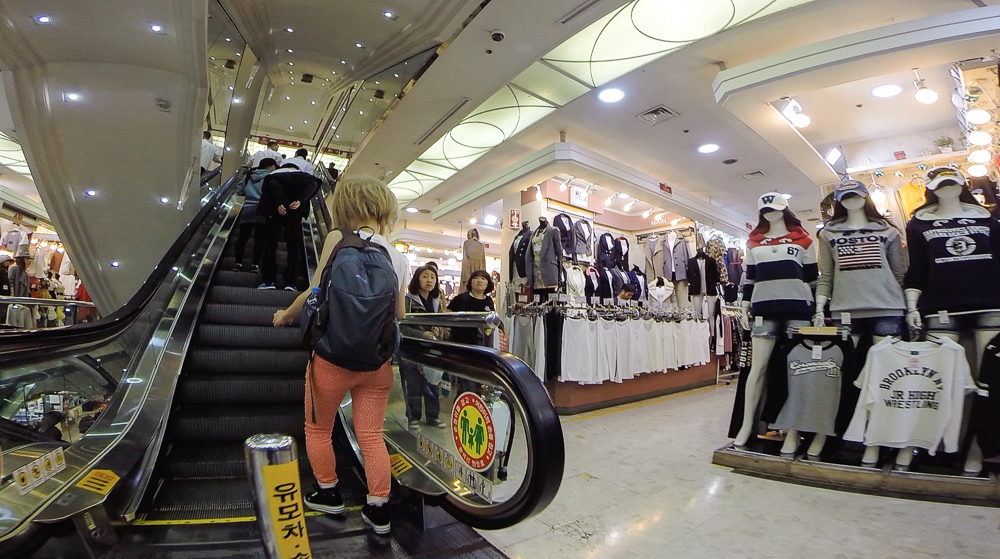FEATURED PHRASES & WORDS:
자켓 있어요?
Jakit issuhyo?
Do you have jackets?
You can replace "jakit/jacket" with another noun.
향수 있어요?
Hyangsu issuhyo?
Do you have perfume?
팬티 있어요?
Penti issuhyo?
Do you have panties?
양말 있어요?
Yangmal issuhyo?
Do you have socks?
The worker will say yes or no.
있어요.
Issuhyo.
We have them.
없어요.
Eobssuhyo.
We don’t have them.
You can then ask:
어디서 팔아요?
Uhdiseo parayo?
Where is it sold?
What if you want to be more specific?
Maybe you want a black dress.
검은 치마 있어요?
Geomeun chima issuhyo?
Do you have black dresses?
Or maybe you want a thick coat.
두꺼운 외투 있어요?
Dogguhoon waeteu issuhyo?
Do you have thick coats?
Simply place a conjugated adjective in front of the noun. Then add “issuhyo” after the noun.
Make sure to lift up the “yo” to make it into a question. If the “yo” goes down, it becomes a statement. For example:
Question:
가벼운 가방 있어요?
Gabyeoun gabang issuhyo?
Do you have lightweight backpacks?
Statement:
가벼운 가방 있어요.
Gabyeoun gabang issuhyo.
I have lightweight backpacks.
Question:
얇은 장갑 있어요?
Yalbeun janggap issuhyo?
Do you have thin gloves?
Statement:
얇은 장갑 있어요.
Yalbeun janggap issuhyo.
We have thin gloves.
Can’t find your size? Then ask:
더 큰 사이즈 있어요?
Deo keun ssaejeu issuhyo?
Do you have a bigger size?
Perhaps you need something smaller.
더 작은 사이즈 있어요?
Deo jageun saejeu issuhyo?
Do you have a smaller size?
Or maybe the size is perfect, but you want a different color?
다른 색 있어요?
Dareun sek issuhyo?
Do you have it in another color?
Finally you everything you need. Time to hit the register. If you need to use the credit card, you can verify by asking:
카드 받으세요?
Kadeu badeuseyo?
Do you accept credit cards?
Always carry cash with you when shopping in Korea because some shops accept cash only. The vendor may reply:
현찰만 받아요.
Hyunchalman badayo.
We only accept cash.
In addition with some shops, you can get a discount with cash, however no discount with credit card. If you need cash, then ask:
제일 가까운 ATM 어디 있어요?
Jeil gaggaoon ATM eodiissuhyo?
Where’s the closest ATM?
Another way of saying this is:
제일 가까운 현금 인출기 어디 있어요?
Jeil gaggaoon hyungeum inchulgi eodi issuhyo?
Where’s the nearest cash machine?
After you pay for your items, you might want the receipt:
영수증 주세요.
Yeongsoojeung juseyo.
Please give me the receipt.
Perhaps you bought the item as a gift, but don’t have time to wrap it. Then ask:
포장해 주실 수 있어요?
Pojanghae jushil su issuhyo?
Could you gift wrap it please?
When you leave the shop, politely say:
감사합니다. 안녕히 계세요.
Gamsahapnida. Annyeonghegeseyo.
Thank you. Goodbye.
Perhaps you want to go back for a refund.
환불해 주세요.
Hanboolhae juseyo.
Please give me a refund.
It’s easier to get a refund at a commercial shop than a stall. Stalls typically don’t give out receipts.
Billy Jin midnight shopping at Dongdaemun.
Let’s say you’re at Dongdaemun. You step into a 9-story mall tower filled with wholesale shops where you can haggle prices. You find a promising stall. Perhaps a vendor has their attention on something else. Ask for them by saying:
저기요!
Jeogiyo!
Excuse me! / Hey!
You say “jeogiyo” to get someone’s attention. It’s typically used towards vendors, waiters, waitresses and strangers. Never towards family and friends.
You find something you want. Ask for the price first before trying the clothes on.
이거 얼마예요?
Eguh ulmayeyo?
How much is this?
저거 얼마예요?
Juhguh ulmayeyo?
How much is that?
Shop stalls typically don’t let you try clothes on, especially when it comes to pants and shirts. However it doesn’t hurt to ask. Jackets are usually fine to try on.
입어봐도 돼요?
Eebuhbwado dwaeyo?
Can I try it on?
If you want to try on shoes, then you’d say:
신어봐도 될까요?
Shinuh bwado dwelggayo?
Can I try these on?
You decide to buy the item and say:
이거 주세요.
Eguh juseyo.
Please give me this one.
Or maybe you want to haggle. Then say:
좀 깎아 주세요.
Jom ggagga juseyo.
Please give me a discount.
Say it with a smile, with slight aegyo or with serious tone. Find out what haggling style works best for you. The more fluent your Korean, the higher chance of you succeeding your bargain.
Upon paying, you can say:
많이 파세요.
Manee paseyo.
Please sell a lot.
It’s a polite greeting to wish their business well.
You might’ve stayed at a shop or stall for awhile. Maybe you even tried a couple clothes on. However you’re not interested in buying anything. Or maybe you want to look at other shops before committing to your purchase. You can tell the shop owner:
더 둘러보고 올게요.
Deo dolabogo olgaeyo.
I’ll be back after looking around some more.



